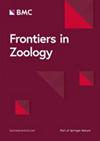Beyond the laboratory: the bank vole (Clethrionomys glareolus) as a novel model organism in biological research
IF 2.6
2区 生物学
Q1 ZOOLOGY
引用次数: 0
Abstract
Rodents constitute a significant proportion of mammalian diversity, with their adaptability and wide distribution making them indispensable study organisms across various biological disciplines. While the laboratory mouse remains a predominant model rodent, the bank vole (Clethrionomys glareolus) offers a unique perspective as a wild rodent within the large subfamily Arvicolinae. Recognized for its relevance to studynatural ecology, the bank vole provides insights into complex ecological interactions, evolutionary adaptations, and disease dynamics. Despite recent recognition of its importance in specific research areas, there is a lack of a comprehensive and up-to-date exploration of its role as a model organism. This review addresses this gap by offering a holistic examination of the bank vole’s applications in ecology, evolution, biogeography, disease dynamics, and host–pathogen interactions. We emphasize novel insights into genetic variation, adaptation to climate change, population dynamics, experimental evolution, host-parasite co-evolution, and disease dynamics studies. By consolidating diverse research findings, this review provides a unique and comprehensive perspective on the bank vole’s contributions to understanding ecology and evolution, underscoring its importance as a model organism in shaping future biological research.在实验室之外:银行田鼠(Clethrionomys glareolus)在生物学研究中作为一种新的模式生物
啮齿类动物在哺乳动物多样性中占很大比例,它们的适应性和广泛分布使它们成为各个生物学学科中不可或缺的研究生物。虽然实验室小鼠仍然是主要的模型啮齿动物,但银行田鼠(Clethrionomys glareolus)作为大亚科Arvicolinae中的野生啮齿动物提供了独特的视角。由于其与自然生态学研究的相关性,银行田鼠为复杂的生态相互作用、进化适应和疾病动力学提供了见解。尽管最近认识到它在特定研究领域的重要性,但缺乏对其作为模式生物的作用的全面和最新的探索。这篇综述通过提供银行田鼠在生态学、进化、生物地理学、疾病动力学和宿主-病原体相互作用方面的应用的全面检查来解决这一差距。我们强调在遗传变异、适应气候变化、种群动态、实验进化、宿主-寄生虫共同进化和疾病动力学研究方面的新见解。通过整合不同的研究成果,本综述提供了一个独特而全面的视角来了解银行田鼠对理解生态学和进化的贡献,强调了它作为一种模式生物在塑造未来生物学研究中的重要性。
本文章由计算机程序翻译,如有差异,请以英文原文为准。
求助全文
约1分钟内获得全文
求助全文
来源期刊

Frontiers in Zoology
ZOOLOGY-
CiteScore
4.90
自引率
0.00%
发文量
29
审稿时长
>12 weeks
期刊介绍:
Frontiers in Zoology is an open access, peer-reviewed online journal publishing high quality research articles and reviews on all aspects of animal life.
As a biological discipline, zoology has one of the longest histories. Today it occasionally appears as though, due to the rapid expansion of life sciences, zoology has been replaced by more or less independent sub-disciplines amongst which exchange is often sparse. However, the recent advance of molecular methodology into "classical" fields of biology, and the development of theories that can explain phenomena on different levels of organisation, has led to a re-integration of zoological disciplines promoting a broader than usual approach to zoological questions. Zoology has re-emerged as an integrative discipline encompassing the most diverse aspects of animal life, from the level of the gene to the level of the ecosystem.
Frontiers in Zoology is the first open access journal focusing on zoology as a whole. It aims to represent and re-unite the various disciplines that look at animal life from different perspectives and at providing the basis for a comprehensive understanding of zoological phenomena on all levels of analysis. Frontiers in Zoology provides a unique opportunity to publish high quality research and reviews on zoological issues that will be internationally accessible to any reader at no cost.
The journal was initiated and is supported by the Deutsche Zoologische Gesellschaft, one of the largest national zoological societies with more than a century-long tradition in promoting high-level zoological research.
 求助内容:
求助内容: 应助结果提醒方式:
应助结果提醒方式:


